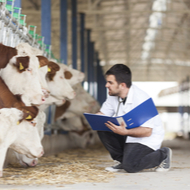- Date posted: 30th November 2020

Groups to consider new policies and definitions for profession
The RCVS has announced that it will be starting two new Working Parties. One of which will consider both the role of veterinary technicians and possible regulation within the profession, while the other will address environmental and sustainability issues.
The Veterinary Technicians’ Working Party will aim to define the role of a veterinary technician and it's scope, as well as considering regulations and educational standards for the role.
The Working Party will include representatives from the British Cattle Veterinary Association (BCVA), along with members of RCVS and VN Councils.
Linda Ford, a lay member of RCVS Council and the chair of the Working Party, said: “The aim of the Working Party will be to more clearly define the role of veterinary technician, and it how fits alongside the established role of veterinary nursing and within the vet-led team.
“The group will review the current set-up for veterinary technician courses and qualifications, with a view to incorporating them as a defined veterinary profession and associates of the RCVS within time.”
The Environment and Sustainability Working Party will be collaborating with the UK Health Alliance on Climate Change (UKHACC). It will aim to create a formal environment and sustainability policy for the College and for the profession. It will also seek to make recommendations regarding new potential environmental and sustainability initiatives.
Sue Paterson, an RCVS Council member and chair of the group, said: “In our professional declaration as veterinary surgeons, we pledge to ensure the health and welfare of animals in our care and I think part of this can be a greater recognition of the environmental footprint of veterinary medicine and how we can innovate and change the way we do things to mitigate and reduce our environmental impact.”

